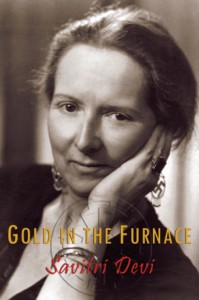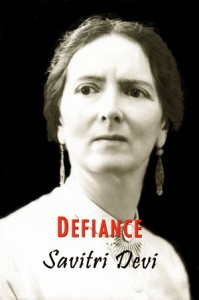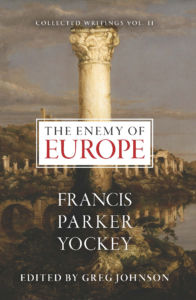The Search for the Holy Grail in Modern Germany: An Interview with Clarissa Schnabel
4,030 words
Clarissa Schnabel has been writing for Counter-Currents for over a year now on a wide range of subjects. I enjoy reading her articles and find them refreshing. In our interview we discussed topics such as German guilt; the New Right; her favorite writer, Savitri Devi; Architektur-Rebellion; activism; the New German Wave in film; nationalist literary fiction; spiritual experiences; prophecy; and many others.
Ondrej Mann: Could you introduce yourself?
Clarissa Schnabel: I’m originally from a small town called Uslar in the beautiful Solling region of Lower Saxony. I moved away for job reasons in my late teens and lived in Hanover for about 20 years before things got too crazy for me there, and am now again living in a small town.
I am a librarian by profession, and a blogger and biographer in my spare time.
OM: I read your short review of Hermann muss Fallen. Is it possible that we will see more reviews of German nationalist fiction, such as Rebelische Herzen, Fackeln in der Deutscher Nacht, or new publications from Hydra Comics?
CS: I have read Rebellische Herzen but wasn’t impressed enough with it to continue with Fackeln in deutscher Nacht. I’ll definitely read new Hydra comics when they are released.
As for reviews, they might make more sense if an English translation of those books were in the works. There are some Counter-Currents readers who speak German, but overall I assume it’s a niche audience. If there is interest in reviews of German-language literature, sure, I’d be happy to do that.
Rebellische Herzen by an anonymous author (who would go on to write Fackeln in deutscher Nacht) is a book I really tried to like. It is much better written than Hermann muss fallen. It is even lyrical in places. But there is no real plot; it’s simply the journey of a young man in nationalist circles. He joins a group, has discussions, gets into fights with Leftists. And again and again there are these really long monologues by the more experienced guys around him, expounding what the movement is all about. The book is a manifesto or a manual rather than a novel. I wish the author and Steve Lizek (the author of Hermann muss fallen) would do a collab. Lizek knows how to craft characters and a story, and our Anonymous knows how to write well. Everybody would win that way.
OM: Are there similar small groups to Counter-Currents and the New Right in Germany?
CS: To be honest, I have no idea. There are a few Ring-wing, mainly patriotic groups that I have heard of, for example Ein Prozent, which is close to Alternative for Germany (AfD), but since I’ve never been much interested in networking, that’s about all I know.

You can buy Savitri Devi’s book, Gold in the Furnace, here.
Counter-Currents is the one exception, and that happened basically by accident. I discovered it when I started doing research into Savitri Devi’s time in Germany, and found the essays very interesting and well-written, so I stuck around.
OM: Germany is gradually waking up and the people see what they don’t want, but they are finding it harder to explain what they do want. In German politics, the AfD is too bourgeois and Die Heimat too unelectable. What is your opinion about German nationalist politics? Have you thought about getting involved?
CS: The AfD might be “too bourgeois” from a White Nationalist standpoint, but it’s certainly not for everybody else. If you talk to people who have moved away from the mainstream media narrative that AfD voters are Nazis and Björn Höcke is Hitler 2.0, they will tell you that the AfD is the only party anyone can reasonably vote for, because it stands for common-sense politics. That is why the BSW (Bündnis Sahra Wagenknecht) appeals to broadly the same voter base. Nationalists will, course of, go with the AfD rather than the BSW, because Wagenknecht is a known Communist.
My gripe with many of those particular voters is that they only think in nationalistic/patriotic terms. Don’t get me wrong, it is a tremendous step forward for Germany, but it lacks a broader perspective. This position is, I think, a sort of natural reaction to decades of indoctrination, but it’s skewed in its own way. For example, you often find “the United States” as an enemy image, with Russia consequently cast into the role of “our secret ally.” That is still the same simplistic, brainwashed pattern of thinking: one side is bad, therefore the other side must be good. One side lied to us, therefore the other side must be honest. Few nationalists seem willing to entertain the idea that neither side are the good guys, if we talk about the government of those countries. World powers don’t have friends, they have interests. So instead of looking either west or east for “friends” — that most German of words! — or “the good guys,” I recommend strengthening ties within Europe. Not via the corrupt European Union, obviously, but as a cooperation between sovereign European nations. Europe has been in a tug-of-war between east and west for so long; it needs to rediscover itself and its own position.
As for getting into politics myself — no, I’d rather not. I don’t have what it takes.
OM: Which German nationalist projects do you consider the most valuable?
CS: Frankly, I believe not so much in big projects than in the seemingly little things. What we need to do is show how beautiful and even “cool” our own culture is, and I’m speaking here not only of Germany. Our own culture has so much to offer; we just need to revive it. That is, in my eyes, the solution to at least half of our current problems. If we are strong in ourselves, in our own identity, we will have a very different attitude and a very different way of looking at things.
Mass immigration from non-European countries, for example, currently forces more and more people of European descent to think about their own identity. They know what they are against; but there is also a need to show them what they are meant to be for.
OM: What five German films would you recommend to readers?
CS: Tough one. I’m more of a documentary watcher, the same way I prefer non-fiction books to novels. So I’ll just give you some of my personal favorites.
1. In jenen Tagen (In Those Days, 1947). A film from the Trümmerfilme genre, of which I am a huge fan. Some very good, although bleak films were produced in 1945-1948. In jenen Tagen is an “Episodenfilm,” which the dictionary tells me translates to “portmanteau film” in English — make of that what you will. It tells the story of a car that is being dismantled in a scrap yard and looks back on its life and its owners. Of course, it’s really their story that is being told in seven different “episodes” or chapters. The film, like most German films of that time (and ever since, let’s be honest), deals with the recent past, aka National Socialism, hence the title.
Script writer Ernst Schnabel, by the way, is no relation.
2. Der Mann, der Sherlock Holmes war (The Man Who Was Sherlock Holmes, 1937). One of the few films, or even the only film from “those days” that is still being shown on TV today, and rightly so. It’s a very entertaining, light-hearted detective story, featuring two of Germany’s biggest stars, Hans Albers and Heinz Rühmann. They portray two petty crooks who impersonate Sherlock Holmes and Dr. Watson and accidentally get drawn into a big case — what did they expect?
3. Der Choral von Leuthen (The Hymn of Leuthen, 1933). Another oldie, this time from the Fridericus series, and my favorite of those films. Frederick the Great faces the famous Battle of Leuthen in December 1757. Otto Gebühr is just fantastic in the role of “Old Fritz.”
I was thinking very hard about a modern film, but most of them I either haven’t watched or wouldn’t recommend. No, I have never seen Das Boot. No, not Der Himmel über Berlin, either. So the next two films come with a caveat: I liked them at the time they were released but haven’t watched them since. I don’t know how well they have aged or how I would judge them today — the “What was I thinking?” effect.
4. Der Untergang (Downfall, 2004). No surprise there; though I suspect it mainly lives off of Bruno Ganz’s performance.
5. Das Wunder von Bern (The Miracle of Bern, 2003). The story of a troubled family against the backdrop of the famous 1954 FIFA World Cup.
What I have wanted to tackle for a long time is the huge Heimat trilogy by Edgar Reitz, mainly because there is a family connection. The fictional village of Schabbach in which the story is set is actually named after the Schabbach family in Hundheim, of which I am a descendant. If I ever get around to watching it, I’ll write a review.
OM: A common problem with nationalists is that they hide their beliefs. Do you have a circle of nationalists around you, or do you rather hide your beliefs most of the time? Do you have any insights into this?
CS: The good thing is that I never learned to hide. I grew up in a very pro-German family — nothing extreme, mind you, and my parents would certainly never have described themselves as nationalists. But I just never learned any of the infamous German self-hatred. Sure, I was much more liberal in my youth than I am now, as well as much more of a believer in the mainstream narrative. But I have always been pro-German, and I have always liked being German.
While I don’t have like-minded people around me, I don’t hide my beliefs. I try not to be as brutally outspoken about them as I usually am, because I still have to live and work with the people here, but they know where I stand. They may not like it; they may get angry at first; yet in my experience, when they realize that you are serious about your beliefs, they will at least accept it.

You can buy Savitri Devi’s Defiance here.
OM: I read some translations of Savitri Devi on your blog. Thanks to this author, you discovered Counter-Currents. What do you admire about her? What do you like about her writing?
CS: What I admire about Savitri Devi is that she didn’t give a damn about other people’s opinion, which is very refreshing. She wrote and said the most extreme, outrageous things that were and still are shocking to most people, and got away with it. She was also very intelligent, with a logical mind; it’s a shame she never got to debate someone from “the other side,” or if she did, we don’t have a record of it.
As for her writings, what fascinates me most is, of course, her portrayal of post-war Germany. It is so immediate, full of interesting little details, and quite different from most other descriptions you find of that time. Because I’m always interested in the human aspect, I began my own research into the people she met. Who were they, what was their story, and might there still be Savitri memorabilia preserved by family members? (I am still hoping to find a copy of her infamous leaflets that got her arrested!)
Also, there are many things to discover about Savitri Devi when you read between the lines. In Gold in the Furnace and Defiance, she is still convinced that Adolf Hitler is alive somewhere. By the time of The Lightning and the Sun she is already accepting the fact that this might not be so. She has also learned of the existence of Eva Braun, which must have come as a shock to her. (It was to many people, by the way.) But, unbendingly loyal as she was, she put on a brave front and praised Eva Braun.
Savitri was in love with Hitler, even though she elevated this to a higher level. She was in love with that god-like figure that she saw embodied or incarnated in Alexander the Great, Tutankhamun, Hitler. If you follow her thinking, these men were all avatars of a god, and she seems to have seen herself as the avatar of his female counterpart. It’s an aspect that hasn’t gotten any attention, as far as I’m aware. Everybody goes on about Hitler as an avatar of Vishnu, but nobody seems to pick up on the other clues.
At any rate, in Pilgrimage, my favorite book of hers, she has more or less resigned herself to the fact that she will never see Hitler in her life. Now, Savitri was unsure whether there was such a thing as reincarnation or not, but she hoped it existed, so she could be born a German in her next life. I happen to believe in reincarnation, so — who knows? Maybe she got her wish.
OM: Personally, I think more people today are thinking that the good guys lost the Second World War and the globalist and bankers — the bad guys — won. Immediately after the war, only General George S. Patton and a few others thought his way. Today, at least in our country, a revision of the history of the Protectorate of Bohemia and Moravia and a revision of the Slovak state is taking place, albeit very gradually, as well as the revision of various minor events. Is there something similar going on in Germany?
CS: I’m afraid not, at least not in the general consciousness. If anything, the mainstream narrative appears to be doubling down, especially as the generation who still has memory of the war and the immediate post-war years (even if they were only children then) is passing away. The younger generations don’t know anything but the narrative.
It is probably easier for a country whose national “mythology,” if you will, is that of being the good guys and/or the victims to dare challenge that narrative. That sounds counter-intuitive at first, but it really goes back to what I was saying earlier. If a people thinks of itself as the good guys, there’s confidence there. Strength. Minor revisions are not a threat then. If, however, a people has internalized the idea of having been the bad guy, the culprit, it is basically the abuse victim story. You think it’s all your fault; so how dare you say it wasn’t?
That being said, while the bad guys behind the scenes certainly won, I am hesitant to cast anyone in the role of the good guys. Better guys, maybe. Things are never as easy or as black-and-white as we’d like them to be. With hindsight, of course, it’s easy to identify the mistakes that were made or the faulty thinking that led to certain decisions, and if anyone had had a crystal ball back then, we’d probably be living in a very different world today.
OM: Are you following the German New Wave in film? Ku‘damm 56, Never Look Away, Babylon Berlin, Generation War: Our Mothers, Our Fathers? I find these films and series interesting and consider them to be of good quality. Personally, I see a new approach to Communism in that the German New Wave is trying to rehabilitate the Communists and depict the German Democratic Republic (DDR, or East Germany) as a good state. In our country, life in Communist Czechoslovakia is always described very negatively. What do you think is the reason for this? Have you noticed this trend in German film as well?
CS: I’m not seeing it so much in films (again, I’m more into documentaries) as in other areas. I touched on that in my recent essay about board games as a mirror of society: the idea or even subconscious belief that Communism was not as bad as National Socialism, simply because West Germany was spared the experience altogether, and East Germany is mainly associated with relatively benign post-Stalinist regimes.

You can buy Francis Parker Yockey’s The Enemy of Europe here.
Now, we have to differentiate a bit here. The narrative of the DDR as a good state has two very different roots. There are the true believers who never really got over losing their way of life, or maybe losing the potential of establishing their earthly paradise. That’s the older generation, of course. The younger generation who glorify Communism have no experience of it at all, and so it’s easy to imagine how perfect everything supposedly was.
Then there is another group that sprung up some years after the German reunification. At the time, we called the trend Ostalgie, from Ost (east) and Nostalgie (nostalgia). People wallowed in the memory of their childhood and youth and talked about all the old films and the old brands and products. I don’t really blame those people, even if that thinking is a bit selective. But we have to remember the circumstances. The people of East Germany were very pro-West while behind the Iron Curtain, and this continued for quite a while after reunification. But our politicians made some extremely bad decisions. East Germany was de facto bankrupt by the time of reunification. Since the factories had belonged to the state, our government then sold them off, or rather they installed an entity called Treuhand to sell off East Germany’s assets. In theory, this would have meant that those factories would simply have passed into private ownership and continued to operate, but we know that that’s not necessarily how capitalism works. Many factories simply closed, and there was suddenly high unemployment where none had existed before. This naturally led to disillusionment with Western ideals in former East Germany.
The difference between the anti-Communist, even anti-Russian (or at least anti-Russian government) stance of all the European countries which were formerly under Soviet control and the more anti-Western, pro-Russian stance in former East Germany originates from that time. If the whole of Germany had been a Soviet vassal state, that difference would not exist, I think. The Poles, for example, remained a single people, developed along the same lines and made the transition from Soviet vassal to sovereign state together. But because of the divide, Germany was a different case. For about 40 years, West Germany had molded itself after the US. So when the two parts of Germany reunited, they were very different people. The East Germans were new to what the rest of the Western world considered normal, and sadly, there was a lot of arrogance — or, put benevolently, paternalism — toward them by West Germans.
OM: Germany is very rich in various spiritual, mystical, occult authors. Are you interested in such things? Do you have any spiritual ideas? I know you collect and publish various German prophecies.
CS: I am an adherent of the Grail Message by Abd-ru-shin (Oskar Ernst Bernhardt). So yes, I consider myself a spiritual person. I haven’t looked into other teachings, though I would like to read Jakob Lorber someday.
Prophecies are something that fascinate me, but I’m more of a “let’s wait and see” kind of person. Too many people go crazy with it, trying to decode prophecies and make them fit the present day — whenever that present day is. That is not a new phenomenon, by the way. You can find books from the nineteenth century where the author discusses older prophecies and tries to make them fit his present day. And don’t get me started on the Revelation (aka the Apocalypse) in the Bible! The kind of wild interpretations you find out there are insane.
That being said, I do believe that more people than you’d expect have “the Sight.” Not necessarily on the level of Alois Irlmaier or Nostradamus (that’s another topic right there), but there are several examples in my own family, past and present. Back in the day, people just didn’t talk about it openly, which was perhaps a legacy from the witch hunts, though personally I think it goes back further. Today, they publish books about it . . .
OM: And would you like to describe to readers some experiences or family history about “the Sight”?
CS: Well, it was cases of somebody seeing that a family member had died unexpectedly or of dreams that came true a little while later, down to the details. Things of that nature.
Other visions, if one wants to call them such, either in dreams or in waking hours, contain symbols, and it only becomes clear later on what they meant. That is, of course, something that skeptics will have a field day with, because they’ll assume the meaning has only been interpreted into the vision after the fact. And that’s okay; I’m actually all for skepticism. In these things, too, I am a wait-and-see person. That’s why I always write down these things when they occur, so I can check later if there was anything to them or not. But you learn a few things over time. A sword, for example and not surprisingly, always stands for some kind of trouble. That has checked out over the years.
OM: In Norway, the Architectural Uprising — the “alternative to ugliness” movement — has started. This movement promotes beauty in architecture against concrete-and-glass blocks. In Germany and Hungary there is a lot of renovation of historic buildings and construction of new buildings in their historic styles. In Germany, the Architektur-Rebellion, or Lasst uns wieder schöner bauen (Architectural Uprising Germany) was founded for this reason. This is a nation or a group of people who want to preserve their own architecture and style, think about the future, and who probably want to preserve their folk as well. Personally, I think it is one of the indicators that people want to preserve their ethnicity. Do you have any insight into tis?
CS: I wasn’t aware of this movement, probably because I’m not on social media (except for a rarely-used X account); as far as I can see, Architektur-Rebellion is mainly active on Facebook and Instagram. But I wholeheartedly agree with the idea.
As for the motivation of the people behind it, I don’t know how many of them think in ethnic terms. Undoubtedly, some of them do. But I also found an article by a moderator of the group’s Facebook page, who is the art and architectural historian Damian Kaufmann. While most of the article is about him stressing that he is not a Right-wing populist, Kaufmann names ugly, soulless, and plain boring modern architecture as the reason why he works for the group. I suspect others, too, are motivated by “the necessity for beauty” (in the words of Robert W. Chambers), which is a healthy sign. People ooh and aah at the Elbphilharmonie, but who wants to live surrounded by architecture like that? It’s purely intellectual admiration. On the other hand, if you take Wernigerode in the Harz region or Castle Combe in the United Kingdom, they speak to the heart, to the soul. It sounds corny, but it’s nevertheless true. It is a natural reaction.
As we were just talking about it, here’s a quote from the Grail Message:
But this God-willed beauty cannot come about as long as the leaders try to force upon their people and upon their country foreign habits and customs, foreign clothing, and foreign architectural styles in the illusion that this makes for the progress of their people. . . .
The best measure of this is the sense of beauty which is given to you so that you may recognize what is right and what is wrong in these matters.
OM: Is there anything else you’d like to tell our readers — perhaps something about your lifestyle, interests, or other interesting facts? Thank you for the interview.
CS: Thank you very much indeed. Those were really interesting questions!
Interested readers can visit my blog. There aren’t many overtly White Nationalist texts there; it’s mostly about my biographical research and translations of obscure texts that are only available in German (hence “Sources and Resources” in the subheading).
I would like to thank everyone at Counter-Currents, editors as well as writers and readers, for welcoming me so readily when I showed up out of nowhere. It’s a good community you have built there, and I’m glad to be part of it.
All the best,
Clarissa Schnabel




